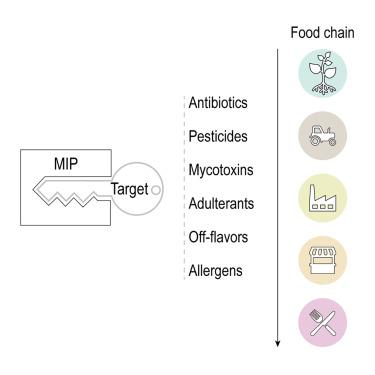Chem ( IF 19.1 ) Pub Date : 2022-06-21 , DOI: 10.1016/j.chempr.2022.05.021 Laura Carballido , Thomas Karbowiak , Philippe Cayot , Massimiliano Gerometta , Nicolas Sok , Elias Bou-Maroun

|
Molecularly imprinted polymers (MIPs), often referred to as “artificial” or “plastic” antibodies, are synthetic alternatives to natural receptors. Based on the “key-and-lock” principle, a template is imprinted into a polymer, which is then able to selectively bind to a target molecule. Over the past 50 years, MIPs have continued to attract attention in both academic research and commercial applications. MIPs have a wide range of applications in analytical chemistry, medicine, and pharmaceutics, as well as in the environment. This paper highlights the new perspectives offered by molecularly imprinting technology to food science. Food analysis is challenging because of the complexity of food matrices and the low concentration of analytes. MIPs are ideally suited to overcome both of these issues because of their high selectivity and sensitivity. Furthermore, MIPs could greatly benefit the entire food chain as a tool to ensure food safety, quality, and traceability, while reducing food waste.
中文翻译:

分子印迹聚合物的应用及其作为食品质量追踪器的前景
分子印迹聚合物 (MIP),通常被称为“人造”或“塑料”抗体,是天然受体的合成替代品。基于“钥匙锁”原理,模板被印入聚合物中,然后能够选择性地与目标分子结合。在过去的 50 年中,MIP 在学术研究和商业应用中不断受到关注。MIP 在分析化学、医学和药剂学以及环境中具有广泛的应用。本文重点介绍了分子印迹技术为食品科学提供的新视角。由于食品基质的复杂性和分析物的低浓度,食品分析具有挑战性。MIP 非常适合克服这两个问题,因为它们具有高选择性和灵敏度。











































 京公网安备 11010802027423号
京公网安备 11010802027423号